Pope Francis


Pope Francis is a straight shooter who does not mince words: "If we destroy creation, creation will destroy us,” the pontiff said last year. “Never forget this!”
The pope’s warning and calls for action have galvanized many religious leaders from across Maryland to step up our efforts to protect God’s creation from climate change disruptions. We understand that it is the poor and most vulnerable among us who are bearing the brunt of human-induced climate change. Unless we act now, the impacts of devastating super-storms, massive floods, droughts, and crop failures will only accelerate. Refusing to bury one’s head in the sand and facing squarely the reality of climate change is a fundamental issue of justice and respect for life.
This is why I, a Franciscan friar priest, have joined more than 230 Maryland religious leaders, including Bishop Dennis Madden of the Catholic Archdiocese of Baltimore and six other leaders of Christian denominations across Maryland, in issuing an urgent, moral challenge. We are calling on Marylanders — including our elected officials — to take action on climate change by helping to shift our state’s energy policy towards renewable, clean energy sources.

President Obama will welcome Pope Francis to the White House during the pontiff’s U.S. visit in September to “continue the dialogue … on their shared values and commitments on a wide range of issues,” White House press secretary Josh Earnest said March 26.
The meeting with the president and first lady will take place on Sept. 23, apparently near the start of a visit — the first to the U.S. by the Argentine pope — that will take Francis from the U.S. Capitol to New York and the United Nations and will conclude with a huge outdoor Mass in Philadelphia.
“During the visit, the President and the Pope will continue the dialogue, which they began during the President’s visit to the Vatican in March 2014, on their shared values and commitments on a wide range of issues,” Earnest said in a statement.
Those issues, he said, include “caring for the marginalized and the poor; advancing economic opportunity for all; serving as good stewards of the environment; protecting religious minorities and promoting religious freedom around the world; and welcoming and integrating immigrants and refugees into our communities.”
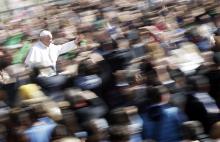
Pope Francis appears more popular than ever among American Catholics, and he hasn’t even visited the U.S. yet, a trip that is planned for September and could well boost his visibility — and appeal — even further.
But will Francis find American Catholics filling the pews? Or just loving the pope from afar? That’s one of the big — and so far unanswered — questions about his remarkable papacy.
Now, one researcher may have found some signs, albeit tentative, of an incipient “Francis effect.”
Mark Gray of Georgetown University’s Center for Applied Research in the Apostolate crunched the Catholic numbers from the 2014 General Social Survey, the go-to resource for sociologists. The GSS began in 1972 and is conducted every two years using face-to-face interviews with a national random sample of adults.
Gray noted that when asked to characterize the strength of their religious affiliation, 34 percent of Catholics said it was “strong,” up from 27 percent in 2012, the year before Francis was elected.
That 7-point rise was a “significant bounce,” Gray said.
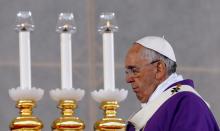
On March 20, Pope Francis issued his most forceful call yet to abolish the death penalty, one that seemed to go even beyond current church teaching. Francis’ latest moves could signal a further development in Catholic teaching against capital punishment — and in his relationship with some U.S. Catholics.
“Today the death penalty is inadmissible, no matter how serious the crime committed,” Francis wrote in a detailed argument to the president of the International Commission against the Death Penalty, based in Madrid.
The pope said capital punishment “contradicts God’s plan for man and society” and “does not render justice to the victims, but rather fosters vengeance.”
Francis added that executing a prisoner can no longer be justified by a society’s need to defend itself. He addressed two issues prominent in the American context: He declared that the death penalty “loses all legitimacy” because of the possibility of judicial error, and he said “there is no humane way of killing another person.”
Several recent botched executions have given anti-death penalty advocates more ammunition for their arguments.
In his letter, the pontiff also repeated his view, expressed last October, that keeping inmates isolated in maximum security prisons is “a form of torture” and that life sentences are “a hidden death penalty” that should be abolished along with capital punishment.
These are unusually categorical and expansive statements, and they come on the heels of a campaign to abolish the death penalty worldwide, which gained Vatican support at a United Nations meeting in Geneva earlier this month.
In addition, four national Catholic journals from across the ideological spectrum — the National Catholic Reporter; America; Our Sunday Visitor; and the National Catholic Register — earlier this month published an unprecedented joint editorial calling for an end to the death penalty in the U.S. in the wake of those botched executions and increasing doubts about the fairness of the justice system.
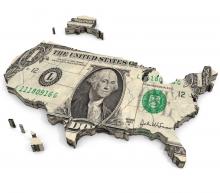
The movement to give every American an equal say in the government decisions that affect our lives gained a “great new ally with a worldwide voice” last week. I’m referring of course to Pope Francis, who when speaking to an Argentine magazine said, "We must achieve a free sort of election campaign, not financed. Because many interests come into play in financing of an election campaign and then they ask you to pay back."
The Pope is a welcome addition to the growing national movement in the United States that aims to refocus government on fulfilling the needs and concerns of everyday voters, not on granting special favors to big campaign donors. In his first two years since inauguration, Pope Francis has dedicated his papacy to addressing the staggering economic inequality tearing lives apart here in the U.S. and around the world.
His statement on how we finance elections is not a deviation from that mission. It is an acknowledgement that a functioning democracy and economic fairness are two sides of the same coin. For years political leaders have perpetuated a vicious cycle of economic inequality begetting political inequality, and vice versa. The policy levers we pull must reverse this system to create a virtuous cycle of greater economic prosperity and freedom begetting greater political equality.
Pope Francis understands this, and so too do a growing number of religious communities organizing to tackle the problem of money in elections. The Franciscan Action Network, the organization that I direct, leads a coalition of 18 national faith organizations urging the U.S. Congress and President to take steps to reduce the corrupting influence of money in elections. Methodists, Presbyterians, United Church of Christ, Muslims, Quakers, Mennonites, Disciples, and several Catholic organizations and religious orders have joined with others to call out their shared teachings about integrity and honesty, and their belief that a democratic country should actually adhere to democratic practices.
A variety of faith traditions have joined in our call for a constitutional amendment to curtail the role of money in politics. In the sacred texts and writing representing each of our spiritual traditions we find stories warning us about the evils of worshiping money.
In the Jewish tradition, the Talmud states, “A mitzvah is better done personally than done via agent.”
In the Christian tradition, the Gospel of Mathew tells us, “You cannot serve both God and money.”
These warnings are found throughout all faith traditions.
We applaud the Pope’s efforts in this struggle and encourage him to amplify his call for a more representative system for funding elections when he addresses Congress in September. After all, the American system is a prime example for the world of how not to fund elections. The rise of super PACs and outside political groups have given the billionaire class ever more power to bankroll the election campaigns of our elected leaders.
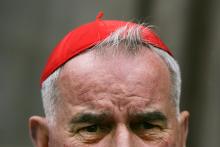
Scottish Cardinal Keith O’Brien, who was accused of sexually harassing several men in a scandal that exploded on the eve of the 2013 conclave that elected Pope Francis, has renounced the “rights and privileges” of his office but may keep his prestigious title, the Vatican announced March 20.
O’Brien did not take part in the March 2013 conclave and now he will be barred from any future conclaves. At age 77, he would have lost his voting eligibility at age 80.
Francis had been under pressure to take some action against O’Brien since one of his victims revealed that an internal church report on O’Brien had been sent to Rome and was “hot enough to burn the varnish” off the pope’s desk.
At least five men — three priests, a former priest, and a former seminarian — accused O’Brien of either sexually harassing them or pressuring them into sex, in allegations that went back to the 1980s. O’Brien was accused of being sexually active up through at least 2009.
Those were also the years in which O’Brien became increasingly outspoken in his denunciation of homosexuality and gay rights; he called to homosexuality a “moral degradation” that was “demonstrably harmful” to gay people. In response, the gay rights group Stonewall crowned O’Brien “bigot of the year.”
When Pope Benedict XVI accepted O’Brien’s resignation as one of his last official acts before retiring, O’Brien admitted “there have been times that my sexual conduct has fallen below the standards expected of me as a priest, archbishop and cardinal.”
Adding to the urgency for Francis to take further action were recent reports that the Archdiocese of St. Andrews and Edinburgh, which O’Brien headed until he resigned in the wake of the initial revelations, had spent nearly $300,000 on a retirement home for O’Brien in northern England.
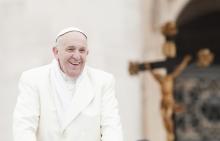
When Pope Francis pays a visit to Naples March 21 he will have lunch with some 90 inmates at a local prison, a contingent that will reportedly include 10 from a section reserved for gay and transgendered prisoners, and those infected with the virus that causes AIDS.
The stopover at the Giuseppe Salvia Detention Center in Poggioreale, near Naples, was originally not scheduled to include lunch, according to a report from Tv2000, an Italian television network operated by the country’s Catholic bishops.
But the pope insisted on the meal, which will be prepared by the prisoners, some of whom will come from two other detention centers. The 90 were chosen by lottery from among 1,900 inmates, according to the Vatican Insider website .
Among the many innovations Francis has made since his election two years ago this month has been a new tone and approach to gay and transgender people.
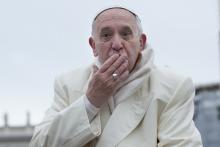
In a wide-ranging interview he gave March 13 for the second anniversary of his election, Pope Francis touched on a variety of topics, from his concern about bad homilies to his upcoming U.S. visit to his one real wish: to go out for a pizza without being recognized.
But leading most of the news coverage were his remarks suggesting that he expects his papacy to be short, perhaps lasting no more than another year or two.
“I have the feeling that my pontificate will be brief: four or five years; I do not know, even two or three. Two have already passed,” he told a Mexican television station.
“Say it ain’t so, Pope!” as the lead on the New York Daily News’ story on Francis’ “shocking comments” put it.
“I just want him to be around for as long as possible,” Cardinal Timothy Dolan told the tabloid.
“I need him. We need him. The church needs him.”
To be sure, the prospect of Francis’ imminent retirement — or demise — would be dismal news for Francis’ many fans, and perhaps a rare lift for his opponents.
In fact, Francis has suggested on several other occasions that he did not expect his papacy to be too long, and one can understand why he would say that:
- He is 78 years old, and while he is amazingly active and productive, he suffers from various pains and potentially more serious health issues. His aides worry about the pace he keeps, and he repeatedly ignores their pleas for him to slow down.
- In recent decades both Pope Paul VI and Pope John Paul II were targets of assassination attempts (a shooter in St. Peter’s Square critically wounded John Paul) and in a world reeling with terrorist attacks and religious strife, Francis knows he is a potential target.
- John Paul reigned for 26 years, the third-longest papacy in history, so compared with that even a decade-long pontificate would seem short.
- John Paul’s successor, Benedict XVI, opened a new option — which Francis has praised — when in 2013 he became the first pontiff in six centuries to retire, and after just eight years, at the age of 85.
But a closer reading of Francis’ remarks, and analysis from those who know the pope, say that’s not what he meant, at all.
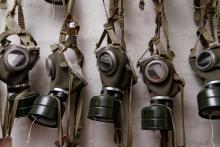
Setsuko Thurlow was 13 when “progress” came to Hiroshima in a white-hot flash. In the dark silence following the nuclear bomb blast, Thurlow recalls children crying, “Mama, help me. God, help me.”
Her sister lived for four days. Many of her 351 dying schoolmates “looked like skeletons with skin hanging from their bones.”
They perished in agony.
Today, Thurlow and other survivors travel the globe, sharing their stories with a new generation for which nuclear weapons are an afterthought — seemingly a hypothetical and abstract threat.
The end of the Cold War had a mixed effect on the nuclear equation. Through dogged diplomacy and effective institutions, disarmament continues, though at a slower pace in recent years. There are now 10,000 operational nuclear warheads in the world, down from a high of 64,000 in 1986.
But the specter of nuclear terrorism and regional conflicts between nuclear weapons states makes nuclear weapons even more dangerous in our international system. Deterrence theory, which governed strategic thinking during the Cold War, is a much less compelling framework today.
Thankfully, most states have forsworn these armaments. Nuclear weapons are not vital to any state’s legitimate security interest. No state or NGO has the capacity to respond to the unfathomable humanitarian crisis that would follow an accidental or intentional use of a nuclear weapon.
Thus a growing global consensus now acknowledges the extreme risk nuclear weapons pose.
Pope John XXIII stated unequivocally in his 1963 encyclical “Pacem in Terris,” “Nuclear weapons must be banned.”
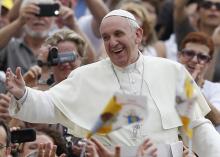
The “Pope of the Interview” strikes again: Pope Francis has given a lengthy — and fascinating — interview to a Mexican television station, which broadcast it on March 13 to mark the second anniversary of his election.
Speaking to the program “Noticieros Televisa,” Francis displays his usual candor, dishing details about the secret conclave that elected him, talking about how he senses his papacy will be short, how the church must get tough on sexual abuse, and how all he really wants “is to go out one day, without being recognized, and go to a pizzeria for a pizza.”
Here are some of the highlights based on Vatican Radio’s English translation and the original Spanish:
On whether he likes being pope:
“I do not mind!”
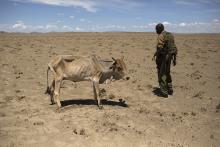
Drying livestock carcasses and anguished faces of hungry women and children have become a common feature here as droughts increase due to climate change.
But now, in an effort to fight hunger, the Roman Catholic Church is making 3,000 acres of church-owned land available for commercial farming.
“We want to produce food, create employment, and improve quality of life for the people,” said the Rev. Celestino Bundi, Kenya’s national director of the Pontifical Mission Societies.
This is the first time the church has entered into large-scale farming, though it owns massive tracts of land across the country, most of which is idle and in the hands of dioceses, parishes, missionaries, and congregations.
“We have the will and the support of the community and government,” said Bundi.
“I think time has come for Kenya to feed herself.”
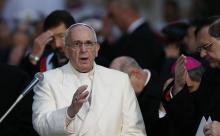
One reason the cardinals gathered in the Sistine Chapel elected Jorge Mario Bergoglio as Pope Francis two years ago on March 13 was a brief but powerful speech the Argentine cardinal made shortly before the conclave in which he denounced the “theological narcissism” of the Roman Catholic Church.
The church, Francis declared, was “sick” because it was closed in on itself and needed to go out “to the peripheries” and risk all by accompanying the shunned and marginalized.
In these past two years, Francis’ efforts to do just that have captivated the public’s imagination and inspired a wide swath of the Catholic spectrum with visions of a newly resurgent faith unshackled from years of scandal and stagnation.
But there was another big reason the cardinals voted for Bergoglio: They thought the Jesuit archbishop of Buenos Aires was the one man with the administrative chops to finally rein in the dysfunctional papal bureaucracy, known as the Roman Curia, that was often at the root of the Catholic crisis.
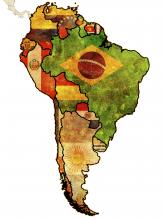
JON SOBRINO LAUGHS ever so slightly at my question. His office in the Monseñor Romero Center in San Salvador is a paper cavern, a place where a theological archeologist digging to understand the highs and the lows of liberation movements within the church would find a mother lode of artifacts.
Where is liberation theology going from here under Pope Francis? Sobrino, perhaps one of the most prolific liberation theologians, is thin and thoughtful. He considers his words: Liberation theology is a way of thinking about how a Christian must live—in active, engaged struggle for the flourishing of all life. Liberation is the primary movement of the Holy Spirit. It is the duty of those baptized into the life, death, and ministry of Jesus Christ to live this out, immediately and urgently.
In March 2013, when Argentine Cardinal Jorge Mario Bergoglio, Sobrino’s fellow Jesuit, became pope, liberation theologians and practitioners took a deep collective breath—what would happen next?

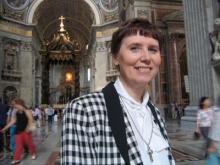
ROME — On its 15 previous pilgrimages, the Catholic gay rights group New Ways Ministry drew maybe two-dozen people to visit holy sites in places like Assisi and Rome.
This year, the number of pilgrims unexpectedly doubled to 50.
Chalk it up to the so-called Francis Effect, where the pope’s open-arms acceptance is giving new hope to gay and lesbian Catholics who have felt alienated from their church for decades.
What’s been even more surprising is that both New Ways and a similar Catholic LGBT organization in Britain are finding support from the Catholic hierarchy in their efforts to meet the pontiff when they both visit the Vatican on Ash Wednesday, the start of Lent, the period of penance and fasting preceding Easter.
For example, Archbishop Georg Ganswein, head of the papal household and the top aide to Pope Emeritus Benedict XVI, responded to New Ways’ request for a papal meet-and-greet by reserving tickets for the group at Francis’ weekly public audience in St. Peter’s Square. It’s not a private meeting — which is tough for anyone to get — but it’s not nothing.
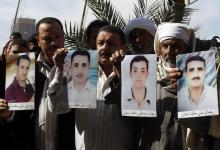
Pope Francis on Feb. 16 denounced the brutal slayings of 21 Coptic Christians in Libya by militants linked to the Islamic State, saying “they were assassinated just for being Christian.”
“The blood of our Christian brothers is a witness that cries out,” Francis said in off-the-cuff remarks during an audience with an ecumenical delegation from the Church of Scotland.
The pope, switching to his native Spanish, noted that those killed only said “Jesus help me.”
“Be they Catholic, Orthodox, Copts, Lutherans, it doesn’t matter: They’re Christian! The blood is the same: It is the blood which confesses Christ,” Francis said.
He said their deaths bore witness to “an ecumenism of blood” that should unite Christians, a phrase he has used repeatedly as the Islamic State continues its bloody march.
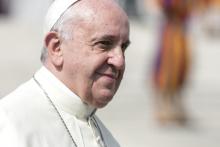
In a powerful sermon that signaled his desire to push ahead with historic reforms, Pope Francis on Sunday said the Roman Catholic Church must be open and welcoming, whatever the costs.
He also warned the hierarchy not to be “a closed caste” but to lead in reaching out to all who are rejected by society and the church.
“There are two ways of thinking and of having faith: we can fear to lose the saved and we can want to save the lost,” Francis told hundreds of cardinals and bishops arrayed before him in St. Peter’s Basilica at a Mass centered on the story of Jesus healing a leper rather than rejecting him.
“Even today it can happen that we stand at the crossroads of these two ways of thinking,” the pope said as he outlined the current debate in the church between those seen as doctrinal legalists and those, like Francis, who want a more pastoral approach.
“Jesus responds immediately to the leper’s plea, without waiting to study the situation and all its possible consequences,” Francis declared. “For Jesus, what matters above all is reaching out to save those far off, healing the wounds of the sick, restoring everyone to God’s family. And this is scandalous to some people!”
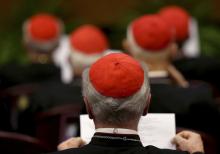
Pope Francis’ new cardinals, who will be formally installed on Feb. 14, represent everything the pope says he wants for the future of Catholicism: a church that reaches out to the periphery and the margins, and one that represents those frontiers more than the central administration in Rome.
That’s why he picked cardinals for the first time ever from countries like Myanmar and Cape Verde, as well as one from the Pacific archipelago of Tonga, which has just 15,000 Catholics out of a population of 100,000 spread across 176 islands.
The 15 new cardinals who are of voting age — five new “honorary” cardinals are over 80 and ineligible to vote for the next pope — come from 14 countries and include prelates from Ethiopia, Panama, Thailand, and Vietnam, and from places in Europe far removed from the traditional power dioceses of Old World Catholicism.
In fact, only one new cardinal comes from the Roman Curia, the Italian-dominated papal bureaucracy that Francis is struggling to tame in the wake of a series of scandals that revealed a deep dysfunction at Catholicism’s home office.
But will diversifying the College of Cardinals make it look more like the church’s global flock of 1.2 billion members?
Or will it leave the electors so fragmented by geography, language and viewpoints that they won’t be able to serve as a counterweight to career churchmen in Rome?
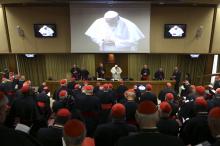
Pope Francis called for a Vatican that operates with “absolute transparency” as he gathered more than 165 cardinals in Rome for high-level meetings aimed at tackling one of the toughest challenges of his reformist papacy: overhauling the dysfunctional bureaucracy of the Roman Curia.
The goal, Francis told a lecture hall filled with the scarlet-clad “princes of the church, is to foster “greater harmony” among the different church offices in a bid to foster “absolute transparency that builds authentic … collegiality.”
“Reform is not an end in itself, but a means of bearing a powerful Christian witness,” Francis said.
That was a nod to the scandals that overshadowed the waning years of Benedict XVI’s papacy and undermined the Vatican’s credibility with the public and the dismayed churchmen who had to deal with the fallout.
The two-day gathering with the cardinals – including the 20 new appointees who the pope will officially elevate on Feb. 14– comes almost two years to the day after Benedict stunned the world by announcing that he would become the first pope in nearly 600 years to resign from office.
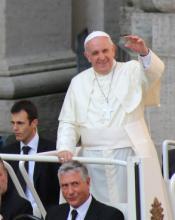
Less than a month after saying Catholics don’t have to multiply “like rabbits,” Pope Francis on Feb. 11 once again praised big families, telling a gathering in St. Peter’s Square that having more children is not “an irresponsible choice.”
He also said that opting not to have children at all is “a selfish choice.”
A society that “views children above all as a worry, a burden, a risk, is a depressed society,” Francis said.
Citing European countries where the fertility rate is especially low, the pope said “they are depressed societies because they don’t want children. They don’t have children. The birth rate doesn’t even reach 1 percent.”
He once again praised the 1968 encyclical of Pope Paul VI, Humanae Vitae, that reiterated the ban against artificial contraception while enjoining Catholics to practice “responsible parenthood” by spacing out births as necessary.
Francis added, however, that having more children “cannot automatically become an irresponsible choice.”
“Not to have children is a selfish choice,” he said. “Life rejuvenates and acquires energy when it multiplies: It is enriched, not impoverished!”